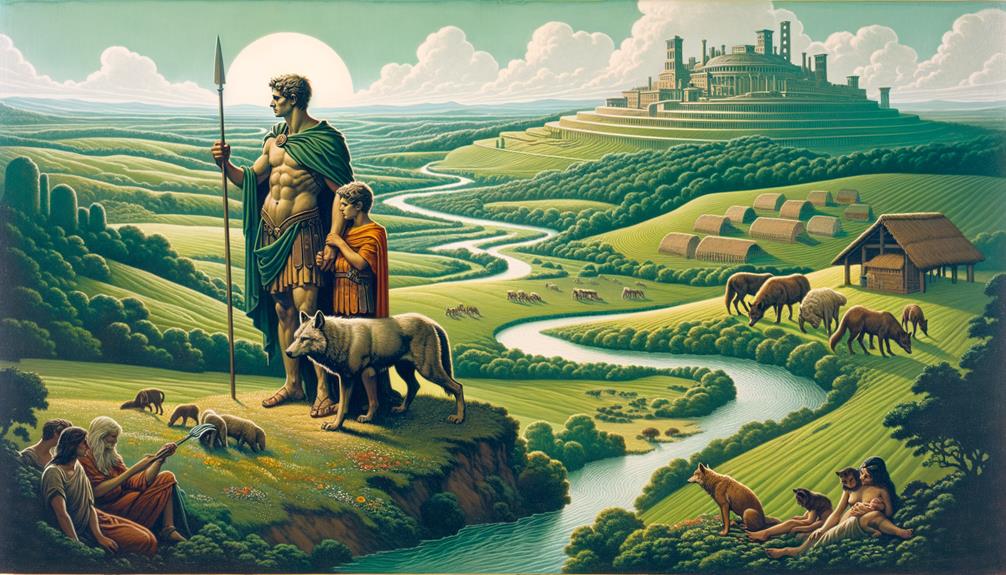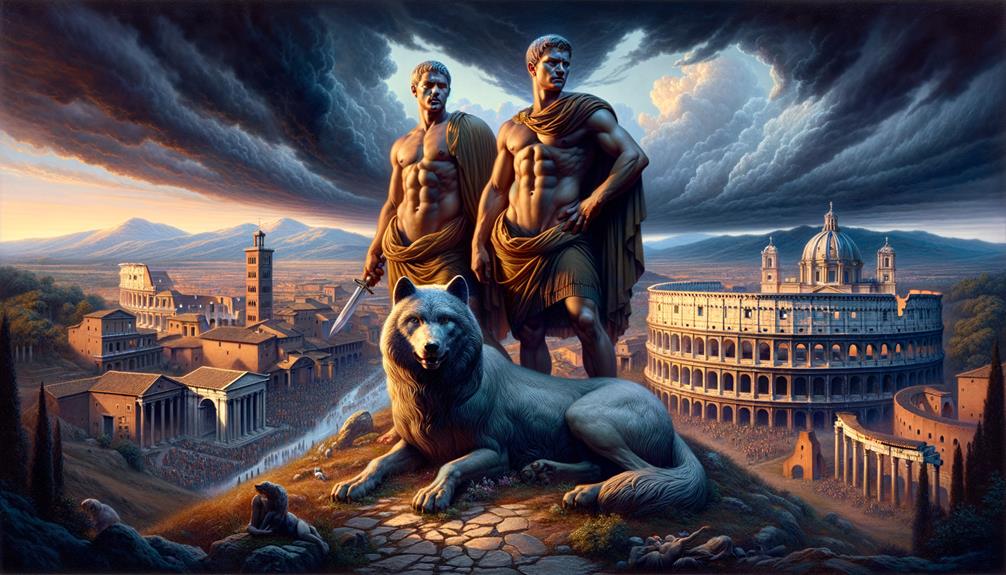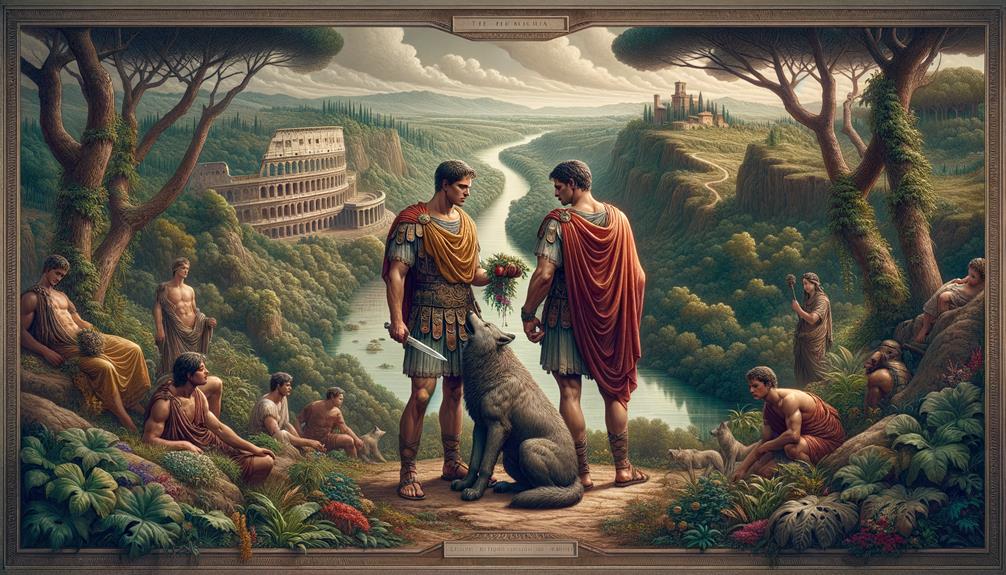The Romulus and Remus legend resonates with archetypal themes that follow their rise from lowly beginnings. Born into royalty yet left for dead, the wolf-raised twins defied odds, guided by prophecy to establish a city surpassing their dire start. Yet the fateful clash between ambition and destiny culminating in Remus's death fascinates most. This pivotal moment prompts reflection: did fate or human flaws truly shape Rome's founding?
The Myth of Romulus and Remus
The tale of Romulus and Remus lies at the core of ancient Rome's origin story – a heroic saga from miraculous birth to defying all odds. This narrative intertwines fate and divinity, laying the groundwork for Rome itself. As twins born to a deposed king's daughter, their greatness was predestined.
Legend narrates how the abandoned infants, adrift on the Tiber River, were rescued by a she-wolf who nurtured them in her den. This iconic she-wolf, symbolizing Rome's fortitude, played a pivotal role in their survival. Raised by shepherds, Romulus and Remus matured into formidable leaders embodying bravery.
More than myth, their story echoes Rome's values and identity. When Romulus killed Remus over the city's location, it marked a fateful founding moment. Romulus emerged as the first king, his legend solidifying Rome's foundation.
Early Life and Survival

Romulus and Remus faced a tough start. Born to Rhea Silvia, the daughter of King Numitor of Alba Longa, their royal blood put them in harm's way. Their mother, a vestal virgin, abandoned them in the Tiber River, though fate intervened.
The river spared the twins, leading them to a she-wolf that nursed and protected them. This image of two infants nourished by a wild beast symbolizes the resilience and raw power that defined Rome.
Eventually, a shepherd named Faustulus discovered and raised the boys. Though from humble beginnings, their upbringing prepared them for coming challenges, instilling strength and street smarts.
As they matured, their noble lineage surfaced, revealing their destiny to establish an eternal city. Romulus and Remus, nurtured by both human and beast, would go on to found Rome after overcoming daunting odds in their early lives.
Founding of Rome

Two brothers, Romulus and Remus, nurtured by a she-wolf and raised by a shepherd, defied the odds to establish Rome, the city destined to become an empire's beating heart. Their legendary journey exemplifies the tenacious spirit that characterized the Roman Empire.
Founding Rome wasn't merely a geographical milestone; it was a heroic saga. Guided by a prophetic vision, the twins chose Palatine Hill, one of Rome's renowned Seven Hills, as their city's birthplace. Romulus took charge, laying the foundation stones amidst sibling rivalry.
The tale recounts a fierce disagreement between the brothers over Rome's future direction. Tragically, Romulus slew Remus, solidifying his role as the first king. This violent act symbolized the unyielding values that would define the Roman Empire's rise.
Thus began Rome's story, intertwined with divine ancestry and heroic deeds. Romulus' legacy endured, shaping an empire's destiny that echoes through history.
The Conflict and Aftermath

The violent clash between Romulus and Remus, brothers driven by ambition, set the stage for Romulus to cement his authority and establish a city destined for greatness. Despite the tragic bloodshed, Romulus remained steadfast in his vision, emerging victorious in their dispute over Rome's location. This conflict solidified his power, enabling him to lay the foundations of what would become one of history's most iconic cities.
Recognizing the need for a robust population, Romulus extended an invitation to fugitives and outcasts, offering them sanctuary within Rome's walls. This influx of diverse individuals proved instrumental in consolidating power and fueling the city's rapid growth.
However, mere numbers weren't enough; unity was essential. Romulus orchestrated the abduction of the Sabine women, a bold act that eventually led to a truce and the integration of the Sabine people. This event symbolized the fusion of cultures, a pivotal factor in Rome's early development.
Through these actions, Romulus not only secured his leadership but also set a precedent for Rome's future—a city built on strength, inclusivity, and the merging of diverse backgrounds.
Representation in Art and Culture

The rich history of Roman mythology has woven the tale of Romulus and Remus into the fabric of art and culture. The iconic image of a she-wolf nurturing the twin brothers stands as a powerful symbol, representing themes of survival and divine intervention. Renowned sculptures like the Capitoline Wolf vividly depict this foundational myth of Rome's origins.
Artworks across various locations further explore this legend's significance. Palazzo Magnani's displays delve into the brothers' heroic journey and the city's beginnings. Gentile da Fabriano's frescoes at Palazzo Trinci capture pivotal moments, breathing life into their adventures and destiny. Jacques-Louis David's 'Les Sabines' and frescoes from Pompeii also reference this myth, showcasing its enduring influence on artistic expression.
Each portrayal, whether grand statues or intricate frescoes, underscores the timeless appeal and archetypal themes embodied by Rome's legendary founders, Romulus and Remus. Their story continues to captivate audiences, reflecting the human experience and the power of storytelling across generations.
Frequently Asked Questions
What Is the Legend of How Rome Was Founded?
According to the legend, my twin Remus and I were abandoned as infants but saved by a she-wolf. We later quarreled over where to build our city. After I killed Remus, I established Rome and became its first ruler, embodying a preordained path and heroic purpose.
Who Is the Founder of the Roman Empire?
Romulus, a mythical figure, founded Rome and laid the foundation for what later became the Roman Empire. His odyssey, filled with challenges and victories, culminated in establishing the city. Romulus' legend remains deeply ingrained in our cultural and historical narratives.
What Would Rome Be Called if Remus Won?
If Remus emerged victorious, the city bearing his name would be Remuria. This ancient story reminds us how small events can reshape the world around us.
Was Romulus the First Ruler of Rome?
Romulus' fabled rise to power unfolds like an epic hero's tale, fraught with challenges that ultimately cemented Rome's destiny. His mythological status as the city's founding figure endures as a cultural touchstone.


